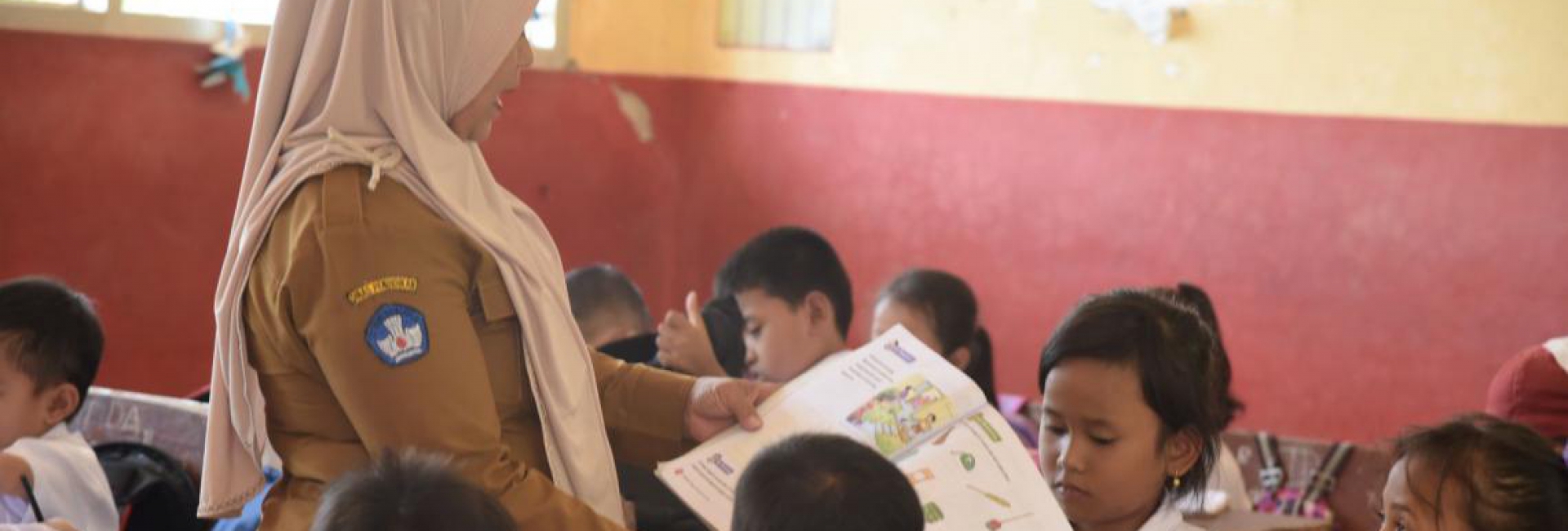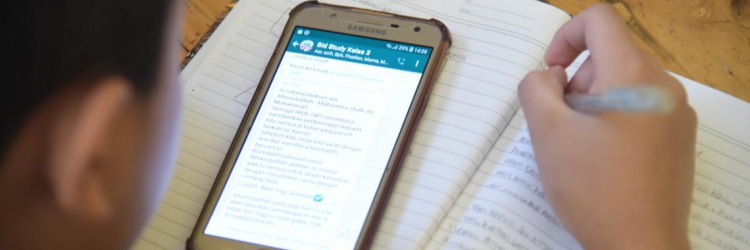This article was written to commemorate National Teacher’s Day on 25 November.
The COVID-19 pandemic has changed teaching and learning activities previously delivered in person in the classrooms to distance learning. In Indonesia, approximately 68 million students are learning from home and four million teachers are conducting remote instruction.
Although the government has issued a guideline for implementing Learning from Home (BDR), not all students can participate due to limited devices and internet access. This situation demands teachers to think harder in order to continue providing optimal learning for all of their students, even in a pandemic situation.
A study on learning during the COVID-19 pandemic conducted by The SMERU Research Institute (SMERU) showed that many teachers in rural areas outside Java Island had to visit each of their students in order to continue BDR. Some teachers even traveled tens of kilometers to teach in person for one hour with each student.
It is undeniable that teachers bear the heaviest burden in the BDR implementation. Teachers are “forced” to adapt quickly in optimising technology to innovate in learning. The lack of a principal's role in supporting teachers to conduct BDR has added to the teaching load to teachers during this pandemic.
In the same study by SMERU, a number of teachers said that using technology could make online learning more effective. However, most senior teachers, who claimed to be “technology illiterates”, had difficulty facilitating students in BDR activities. In reality, teachers’ problems during this pandemic are more than just "technology illiteracy". Teachers do not have the ability to adapt their teaching to the current situation.
“A string of bad luck”
In addition to having to adapt quickly, many teachers are now working beyond regular working hours and are blamed by parents for irregular or ineffective learning. In fact, ineffective learning during the pandemic is not only caused by teachers’ varied teaching abilities, but also due to other factors, such as limited infrastructure.
Based on the Joint Decree of the Four Ministers, the government allows schools to conduct in-person learning in green and yellow zones by implementing strict health protocols. North Kalimantan is one of the provinces with a green zone status based on the National COVID-19 Task Force map.
Mrs. Paulina Melkisidik, a Grade 3 teacher at SDN 002 Malinau Barat, Malinau District, North Kalimantan, was once invited as a resource person at the RISE Programme in Indonesia's Education Discussion event, shared her experience of conducting both distance and in-person learning during the pandemic.
“I have now returned to school [for in-person learning] and followed the health protocols. The students who attend the in-person learning are divided into two groups. We have been back to school since September [Malinau was a green zone]. Praise God until today we are still learning in person and the situation is fine.”
When asked about her teaching experience during BDR, Mrs. Paulina said that she encounters many obstacles. Some parents do not have smartphones, and others complain about buying internet data packages. Also, some of Mrs. Paulina's students go with their parents to work in the fields—and sleep there—making it difficult for the teachers to deliver instruction.
“What we can do is give students assignments using the thematic books (via WhatsApp chat groups). Even this [results in] only a small number of students do it.”
What about students whose parents do not own a smartphone? Mrs. Paulina visits each of their houses to give assignments once a week.
Teaching in the midst of a pandemic: The importance of adaptability
The complaints of teachers who are "technology illiterates" and the protests of parents who feel that teachers are not teaching optimally during BDR can actually reflect teachers' capabilities. Although the government has provided various guidelines for teachers to use during BDR, which can be accessed free of charge, many teachers struggle to put them into practice.
Collie and Martin (2016) stated that there are elements of novelty, change, and uncertainty in delivering instruction. That is why adaptability is an essential capability that every teacher needs to master. Teachers must be able to deal with the different and ever-changing needs of their students by adjusting the pace of the lessons; adopting various activities according to the characteristics of their students; or looking for appropriate references to explain the essence of learning more effectively.
The magnitude of the challenges faced by Indonesian teachers in teaching during this pandemic—ranging from “technology illiteracy” to “confusion” in creating learning innovations—shows that teachers have yet to acquire good adaptability. Teachers in Indonesia have not been equipped with the ability to adapt to novelty (technology), change (policy), and uncertainty (pandemic).
The current pandemic situation can serve as a momentum to organise teacher professional development that also prepares teachers for unexpected situations. It is time for the government to improve in designing and implementing effective teacher development programmes and not just repeating the materials that teachers have already learned in college.
Students miss their teachers
By November 2020, most schools in Indonesia are still closed and children still learning remotely– at least until the end of this year.
Many students are missing their teachers and they look forward to going back to in-person schooling. A teacher at a primary school in Kebumen District assigned his students to compose poems. This one is written by one of his students:
Tuna fish, louhan fish.
When they fought, the tuna lost.
Hey corona, please return to Wuhan.
We miss our teachers back at school.
Nothing can replace the role of teachers in delivering instruction at schools. The Teacher's Day that we commemorate in the midst of this pandemic needs to be filled with appreciation of teachers’ efforts to ensure learning continues.
Let’s hope this pandemic will end soon so that teachers and students can meet again in person at school.
Happy National Teacher’s Day!
Reference: Collie, R.J. and Martin, A.J., 2016. Adaptability: An Important Capacity for Effective Teachers. Educational Practice and Theory, 38(1), pp.27-39.








